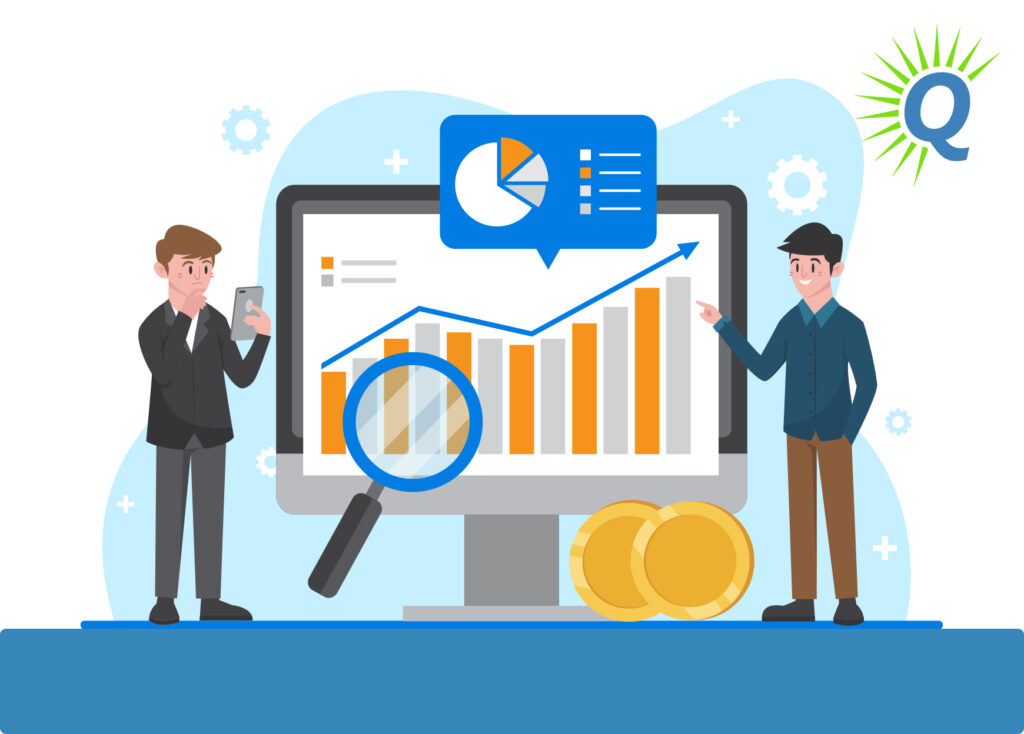Topics:
Never Miss a Beat - Get Updates Direct to Your Inbox
FILTER:


Why Your Business Valuation Method Matters
By Quiet Light
As an owner, it’s crucial to become familiar with how the valuation process works and which business valuation method is most appropriate for your business. By understanding the key elements that ultimately determine your business’s value, you can prepare for a more successful exit when it comes time to sell.
In this article, we discuss:
- The business valuation process and why your valuation method matters
- The benefits of getting a business valuation
- When to get a business valuation
- What information you need to perform a business valuation
- Business valuation costs
Related Article: 4 Ways to Increase the Value of Your Online Business
The Business Valuation Process and Why Your Method Matters
If this is the first time you have valued your company, you may be wondering, “How does the business valuation process work?” In reality, there are many different ways to value a business. Some common methods include:
- Book value
- Market value
- Discounted cash flow
- Income approach
- Asset-based approach
- SDE multiple method
The valuation approach that you choose will have an impact on the value assigned to your business. In addition, prospective buyers may prefer one valuation method over others.
The SDE multiple method is the most widely accepted and utilized method for calculating the value of a company. Below, we explore what the SDE multiple method is and how you can use it to calculate the value of your business.
SDE multiple valuation method
The seller’s discretionary earnings, or SDE, multiple method states that the value of a company is equal to the SDE times a multiple. More simply:
Company value = SDE x multiple
Let’s take a look at what SDE is and the factors that go into determining your multiple.
SDE
The seller’s discretionary earnings are the pretax, pre-interest earnings available to the owner of the business. SDE goes beyond income to more accurately depict the true money-generating capacity of a business. As such, SDE makes it easier to compare two similar businesses to each other than using a criterion like income or revenue.
You calculate SDE by taking the profit and adding back certain discretionary expenses. These expenses, aptly called add-backs, include:
- Noncash expenses
- Interest expenses
- Owner’s benefit
- One-time expenses
- Unrelated income or costs


It is extremely important to add back all allowable discretionary expenses when conducting a company valuation. If you fail to include certain add-backs, you will undervalue your company and leave easy money on the table.
For this reason, many entrepreneurs find it helpful to work with a qualified business Advisor to ensure an accurate valuation. Your Advisor will be better positioned to know which add-backs are allowable and which you shouldn’t include. This helps to create a more thorough and accurate valuation for your company.
“SDE goes beyond income to more accurately depict the true money-generating capacity of a business.”
Thinking of Selling Your Business?
Get a free, individually-tailored valuation and business-readiness assessment. Sell when you're ready. Not a minute before.
Multiple
Company A and Company B could have identical SDE figures but have very different values. The multiple captures this difference.
The multiple incorporates many elements of value. These factors fall into four main categories often called the Four Pillars of Value. These include:
- Growth
- Risk
- Transferability
- Documentation
A company that displays strong past and current growth trends is more valuable.
The more risk a company entails, the less valuable it will be. Risk can come from many areas. On the one hand, younger companies or companies whose success relies on a single point of failure incur more risk. Older companies and companies with diverse operations, on the other hand, are considered stabler and less risky.


The easier it is to transfer your business, the greater its value
Professional documentation is crucial to maintaining a smooth and successful business operation. Companies that neglect their documentation are considered less valuable compared to those that maintain accurate and orderly records.
Your business Advisor will look at each of these four factors when creating your valuation. This allows them to:
- Providing you with an estimate of your business’s worth
- Give you a much deeper understanding of the overall health of your company.
The Benefits of Getting a Business Valuation
You may be wondering, “What are the benefits of getting a business valuation?” As a business owner, having an understanding of the benefits that a valuation brings will help you decide whether a business valuation is right for you at this point in time.
Getting a business valuation can help you:
- Plan ahead
- Understand what drives the value of your business
- Increase your revenue and income
- Increase your business’s value
- Make it easier to sell your business
Plan ahead: know what business valuation method applies to you
An accurate valuation will provide you with an understanding of what you could reasonably expect to receive if you sold your business today. This information can help you determine whether or not it is worth selling your business at this juncture. In addition, it can help you plan your own personal future finances to some degree if you do decide to sell.


“By conducting a valuation, you can use the information you gather to better plan your future actions in order to create a more successful business.”
Understand what drives the value of your business
As mentioned, a business valuation takes into account many objective and subjective factors to produce the final calculation. If you work with an experienced Advisor to conduct the valuation, they will help you understand how your business stacks up against each of the Four Pillars of Value.
Buy a Profitable Online Business
Outsmart the startup game and check out our listings. You can request a summary on any business without any further obligation.
This knowledge can give you insight into what actions you can take to improve your business’s operations and increase its value. For example, the valuation may reveal that you can take steps to mitigate areas of heightened risk or invest in bookkeeping services to clean up your financial documentation.
By conducting a valuation, you can use the information you gather to better plan your future actions in order to create a more successful business.
Increase your revenue and income
Any improvements you make can ultimately increase your revenue and income. As such, getting a business valuation can be helpful even for business owners who are not thinking about selling their company anytime soon.
Increase your business’s value
By optimizing the Four Pillars of Value for your business, you increase value. Given how much blood, sweat, and tears you have likely put into creating a successful business, why would you want to sell it for anything less than top dollar?


Make it easier to sell your business
Optimizing your business is about much more than increasing its value, however. The exit process can be a stressful time for any entrepreneur. By making use of the information you gather during your valuation to create a more streamlined and well-run operation, you increase your chances of having an easier time selling your business.
A well-run business is more attractive to prospective buyers than an inefficient one. This creates competition and makes it easier for a potential buyer to ensure that their questions are answered during the buying process. Both of these factors help to create a smoother, less stressful exit.
When to Get a Business Valuation
Many entrepreneurs think about getting a business valuation right before they plan to sell their business. While knowing the market value of your business just prior to selling it is important, there are other times when it may also pay to value your business.
In fact, it is advisable to get a business valuation long before you plan on selling. Since changes to your business take time to implement and bear fruit, getting a valuation 12–24 months prior to selling is often recommended. This will provide you with enough time to implement any improvements that need to be made prior to selling your company.
Even if you are not thinking about selling in the next 12–24 months, you could still benefit from getting a business valuation. Again, the information you gather can help you identify strengths and weaknesses and allow you to run a more profitable business.


Speak with a business broker, or business Advisor, today to learn whether or not you may benefit from getting a business valuation.
“Since changes to your business take time to implement and bear fruit, getting a valuation 12–24 months prior to selling is often recommended.”
Valuation Method Basics: Information You Need to Perform a Business Valuation
Regardless of whether you use an asset approach or the SDE multiple method, you will need to have accurate and orderly financial statements to conduct a valuation. You and your Advisor will use your financial statements to calculate your SDE.
In addition, your Advisor will also want to go through your business operations to evaluate how your company stacks up on the Four Pillars of Value. They may look at your supply chain relationships, standard operating procedures, management practices, and more. All of the information they gather will be incorporated into their final business valuation report.
Business Valuation Costs
Many entrepreneurs considering getting a valuation may wonder how much a business valuation costs and whether the benefits justify the costs. Costs vary depending on who conducts the valuation and which business valuation methods they use.


At Quiet Light, our Advisors conduct business valuations free of charge. In addition, we don’t pressure you to sell your business after we have conducted the valuation. Since your business is likely one of your most valuable assets, you should make your decisions based on what makes the most sense for your specific needs.
By understanding the business valuation process, having a clear idea of how a valuation can benefit your business, and knowing when to get a business valuation, you can help yourself take the necessary steps to run a successful business in the near term and create a more profitable exit when you do decide to sell.
Thinking of Selling Your Business?
Get a free, individually-tailored valuation and business-readiness assessment. Sell when you're ready. Not a minute before.





